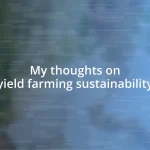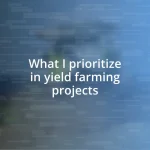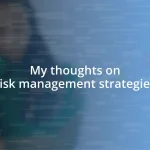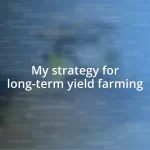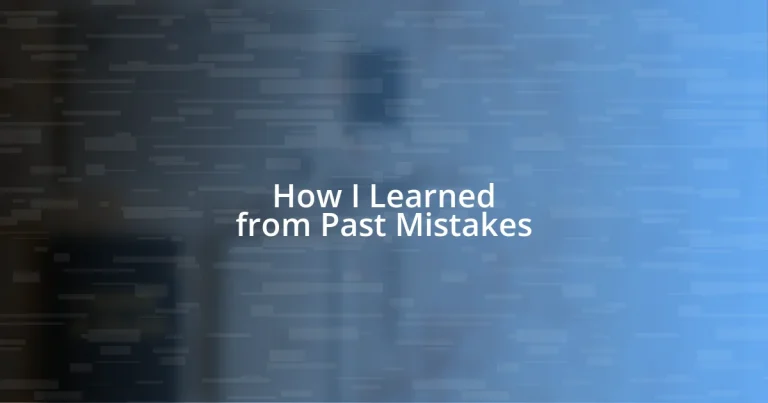Key takeaways:
- Reflection on past mistakes enhances self-awareness and helps identify behavioral patterns, crucial for personal growth.
- Developing a growth mindset transforms setbacks into learning opportunities, fostering resilience and encouraging a proactive approach to challenges.
- Implementing small changes in daily routines, like organizing workspaces and practicing mindful responses, significantly improves productivity and well-being.
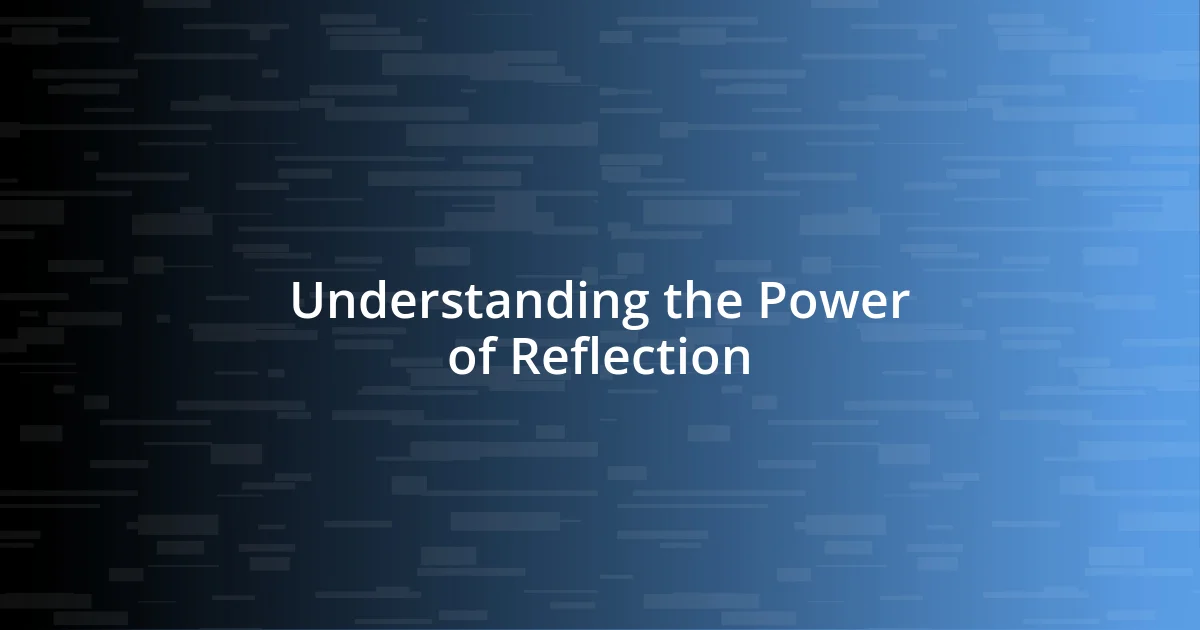
Understanding the Power of Reflection
Reflection is a powerful tool for personal growth. I remember a time when I made a significant misstep at work by not communicating effectively with my team. After some quiet moments of self-reflection, I realized that my failure stemmed from a lack of clarity on my part. How often do we overlook the importance of sharing our thoughts?
Think about it: reflecting on our past mistakes allows us to understand ourselves better. I often revisit moments when I’ve stumbled, and each time, I discover layers of emotion I’d missed initially—fear, overconfidence, or simply a rush to finish. It’s fascinating how these moments of vulnerability can lead to profound insights.
Have you ever taken the time to analyze a decision that didn’t go as planned? I did this after an unfortunate choice during a group project in college. What surprised me was not just the mistake itself, but the realization of how much I had taken my intuition for granted. Reflecting on that experience helped me appreciate the value of balancing instinct with thoughtful analysis.
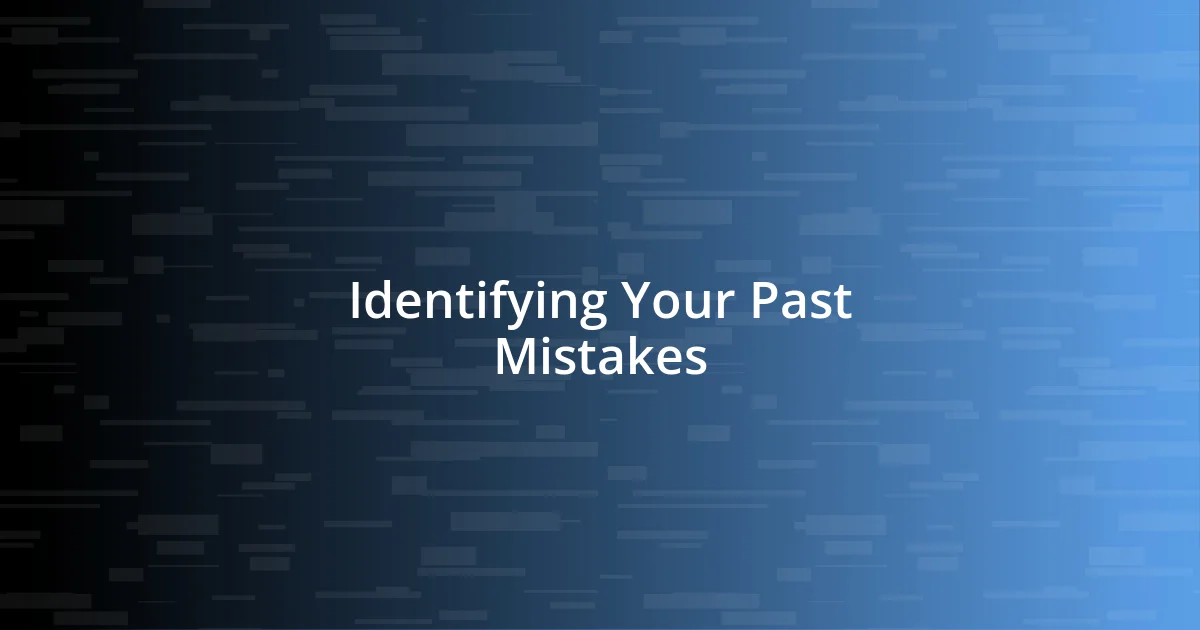
Identifying Your Past Mistakes
Identifying past mistakes is often the first step toward meaningful growth. I remember a time when I missed a critical deadline, which nearly cost me a chance at a promotion. In my quiet moments, I began to sift through the chaos of that experience, and the louder my thoughts became, the clearer the mistake appeared: I had underestimated the time required to complete the project. This realization struck me hard; it made me recognize how procrastination can sneak in under the guise of confidence.
When I think back to personal errors, they often reveal deeper patterns in my behavior. Take, for example, my approach to personal finance. I once dove headfirst into an investment that ended poorly. Initially, I blamed external factors, but over time, I learned that skipping my research was my real downfall. This lesson left me with a newfound appreciation for due diligence—never again would I overlook the importance of arming myself with knowledge.
It’s crucial to regularly assess not just the mistakes themselves, but our emotional responses to them. On several occasions, I found myself stuck in a loop of self-criticism rather than self-improvement. Looking back, I’ve learned to ask myself how each mistake aligns with my values and goals. This introspection leads to greater self-awareness and enables me to transform mistakes into stepping stones instead of stumbling blocks.
| Type of Mistake | Insight Gained |
|---|---|
| Missed Deadline | Time management is crucial; avoid underestimating tasks. |
| Poor Investment | The importance of thorough research before decisions. |
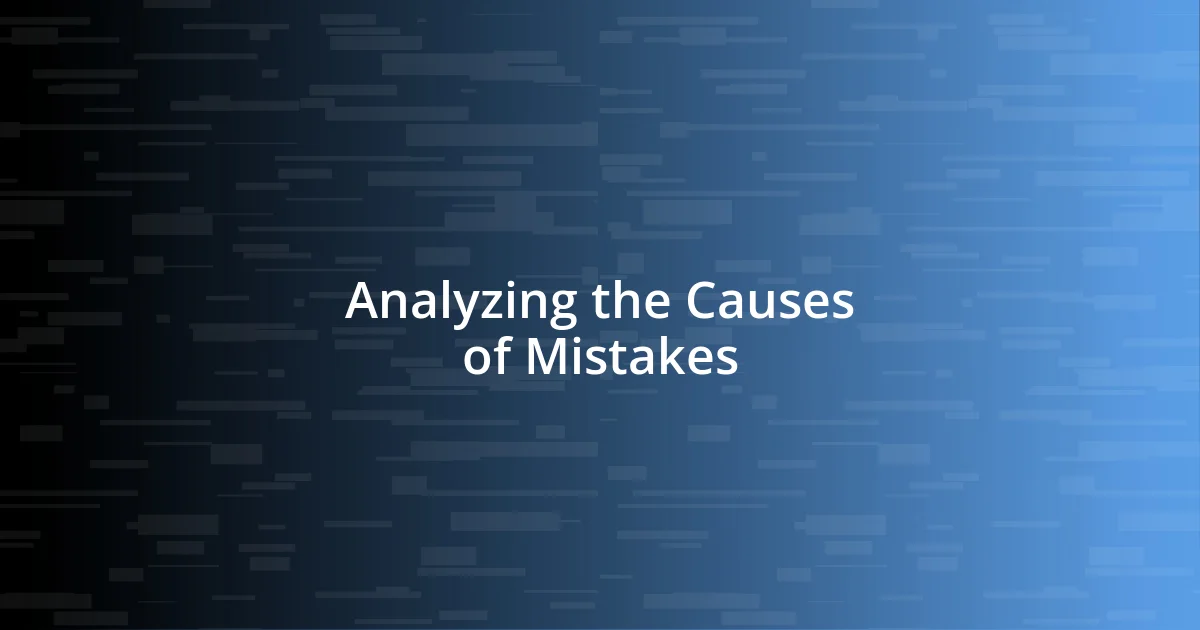
Analyzing the Causes of Mistakes
In my journey of understanding mistakes, I’ve often found that recognizing the underlying causes is essential. For instance, after a tough conversation with a friend that left both of us hurt, I took the time to dissect what went wrong. I pinpointed my tendency to react defensively when I should have embraced empathy instead. This moment was a profound reminder of how miscommunication can stem from our emotional responses rather than the words themselves. Analyzing the root causes revealed not only my weaknesses but also areas where I could actively improve.
- Emotional Triggers: Often, I react based on feelings rather than facts, leading to misunderstandings.
- Perception vs. Reality: I’ve learned that what I perceive in a situation can be colored by my mood, skewing my understanding.
- Communication Gaps: A lack of clarity, whether in tone or intent, usually feeds into larger issues.
Diving deeper into my experiences, I’ve realized that some mistakes come from the patterns we unknowingly repeat. I remember a time when I took the lead on a project but failed to consult my team for their input. This oversight left me feeling isolated and overwhelmed when, in reality, collaboration could have alleviated the pressure. By breaking down that incident, I understood that my desire to control the outcome had blinded me to the value of teamwork. These insights not only helped diagnose the problem but have also shaped my approach to future collaborations.
- Control Issues: A desire for control can sabotage collective efforts—collaboration is essential for success.
- Ignoring Feedback: Dismissing input from others may stem from insecurities and often leads to preventable mistakes.
- Overconfidence: Believing I can manage everything alone has often backfired, the lessons learned are invaluable in teamwork dynamics.
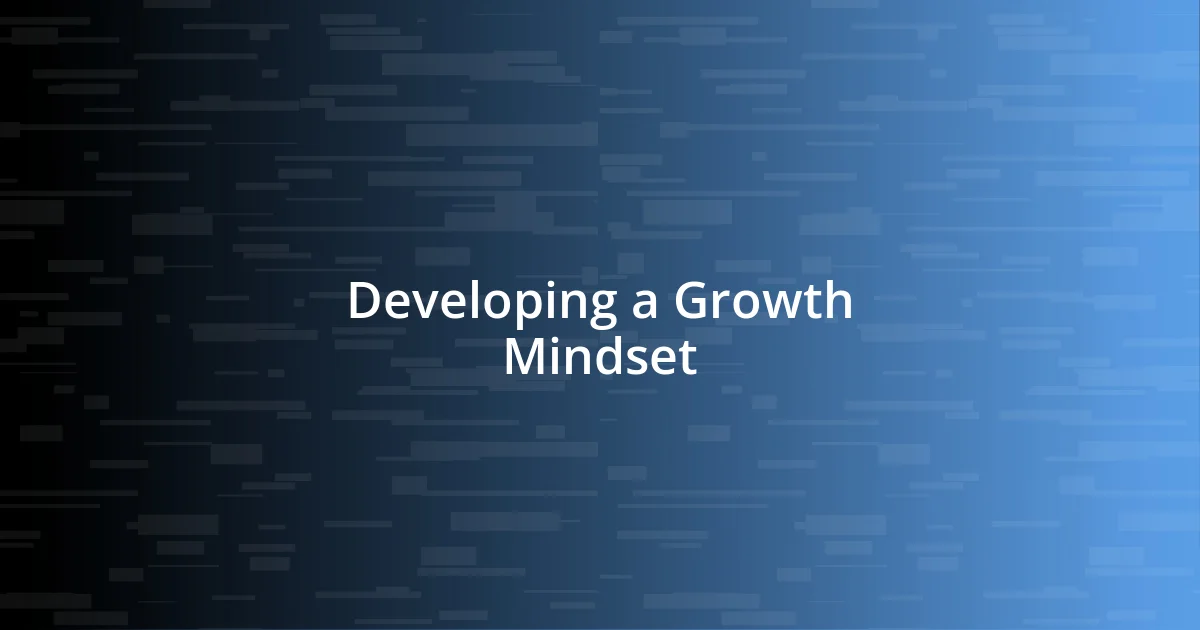
Developing a Growth Mindset
Developing a growth mindset has been pivotal in my journey of learning from past mistakes. There was a phase in my life when I approached obstacles with a fixed mindset, believing that my abilities were static. It wasn’t until I stumbled on a challenging project at work, one that initially left me feeling defeated, that I began to realize the power of adopting a growth mindset. Instead of viewing failure as a dead end, I learned to see it as an opportunity for improvement. Have you ever faced a challenge that seemed insurmountable? Embracing that discomfort led me to seek advice and tackle tasks differently, ultimately transforming setbacks into lessons.
I often reflect on the simple joys of embracing a growth mindset in my daily life. For instance, during a local baking competition, my first attempt at a complex recipe ended in disaster. Instead of giving up, I took notes on what went wrong and sought feedback from fellow bakers. This shifted my perspective—failure became a stepping stone toward mastery rather than a reason to hide. It’s amazing how our failures can inspire resilience; I believe this is universal.
The most rewarding aspect of nurturing a growth mindset is celebrating even the smallest victories. I actively started setting aside time each week to assess one new thing I learned from my mistakes, whether it was about project management or personal relationships. This practice has not only boosted my confidence but also encouraged me to embrace challenges with open arms. Isn’t it empowering to know that every stumble propels us forward?
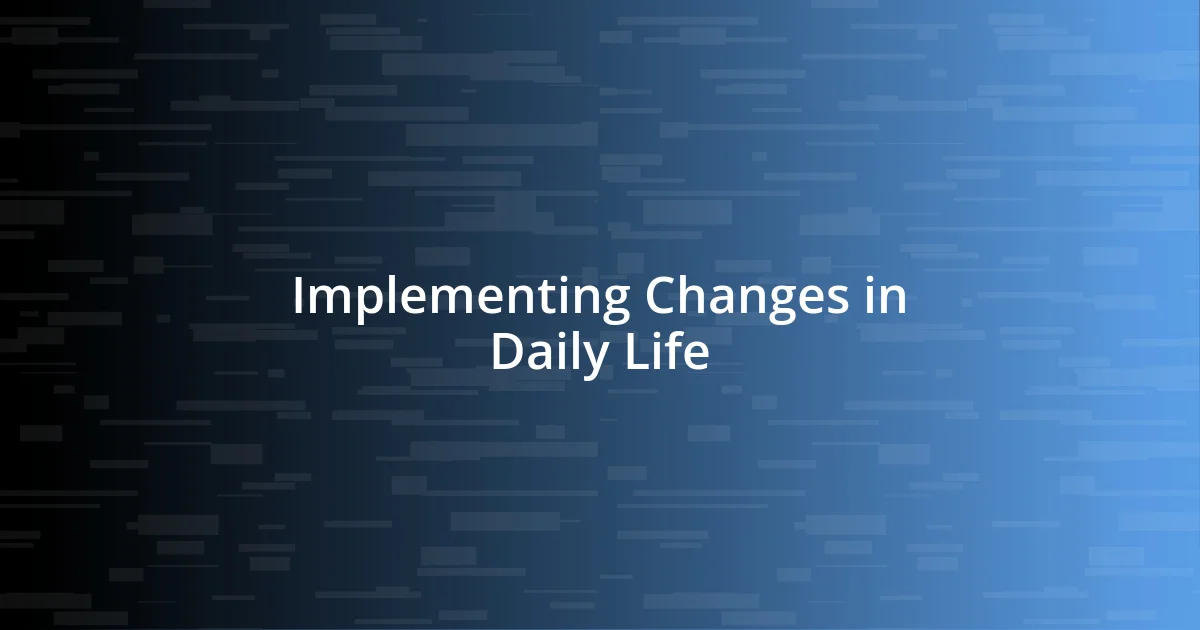
Implementing Changes in Daily Life
Implementing changes in daily life requires conscious effort and a willingness to adapt. I remember a time when I struggled to keep my workspace organized. The chaotic environment led to frustration and mistakes in my work. I resolved to tackle this by setting aside just ten minutes each day to declutter. Surprisingly, that small commitment transformed my productivity and peace of mind. Have you ever felt overwhelmed by your surroundings? Little changes can significantly alter your mindset.
Another shift I made involved my reactions during disagreements, something I used to mishandle quite often. Instead of reacting immediately, I started practicing a pause-and-reflect technique. It sounds simple, but taking a moment to breathe before responding has changed my interactions dramatically. I find it incredible how this one adjustment prevents misunderstandings and fosters healthier conversations. Ever tried giving yourself that pause? You might be amazed at the clarity it brings.
I also recognized that setting boundaries with my time was crucial. In the past, I overcommitted, leaving me drained and resentful. It took a few painful realizations to understand that saying “no” can be just as empowering as saying “yes.” Now, I evaluate my commitments carefully and prioritize what truly matters to me. This shift has not only protected my energy but has also enhanced my sense of fulfillment. How do you determine what deserves your time? Learning to choose wisely is a gift that keeps on giving.
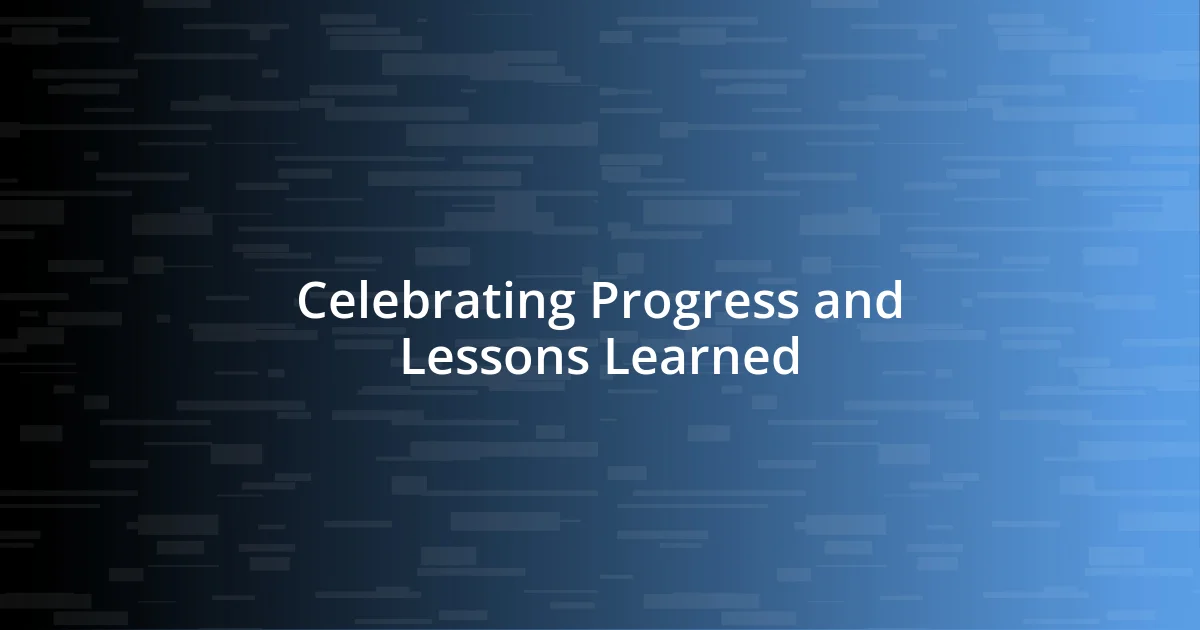
Celebrating Progress and Lessons Learned
Celebrating progress is something I’ve come to cherish deeply. After a particularly rough project left me feeling demoralized, I created a “success jar” where I would drop in notes of accomplishments—big or small. I vividly remember the day I poured out the jar’s contents and was surprised by the wealth of achievements I had previously overlooked. Have you ever taken a moment to really acknowledge what you’ve done, even during the tough times? It’s a simple yet profound practice that reminds us that growth isn’t always about grand successes.
One lesson that stands out for me is the realization that failure doesn’t mean I should retreat; it’s actually a call to action. I recall the time I completely missed the mark in an important presentation. Instead of sulking, I reached out to trusted colleagues for constructive feedback, which not only improved my skills but also forged stronger relationships with them. Isn’t it remarkable how sharing our vulnerabilities can lead to unexpected support? Embracing this open dialogue about lessons learned has transformed my approach to challenges.
Looking back, I recognize how crucial it is to take time to reflect. After each setback, I now dedicate an afternoon to assess what went wrong and why. During one of these sessions, I uncovered patterns in my decision-making that were holding me back. By identifying those habitual missteps, I began to celebrate the clarity I gained from acknowledging them. Have you ever paused to unpack your mistakes? That reflective moment can often reveal paths to progress we might not have seen before.


